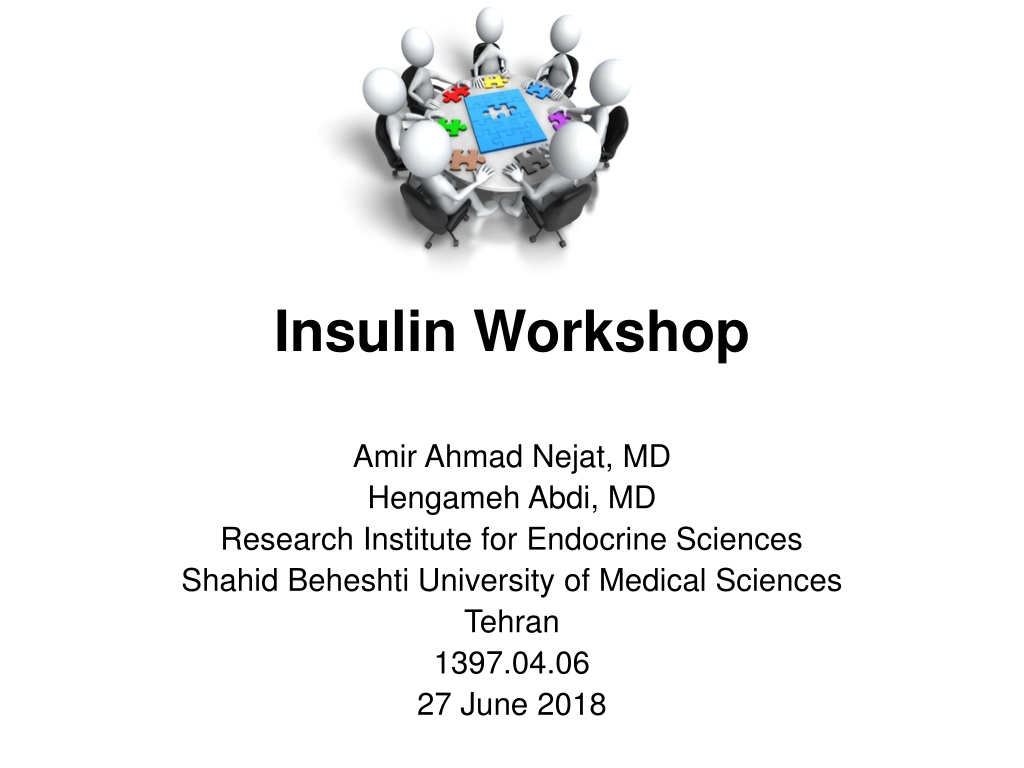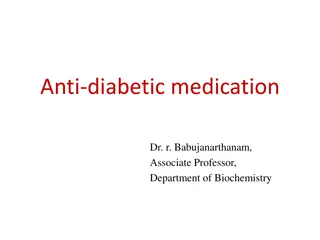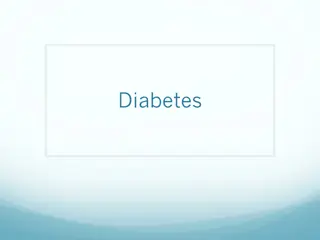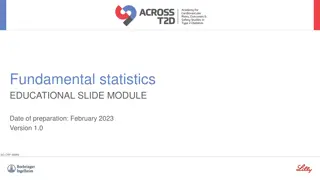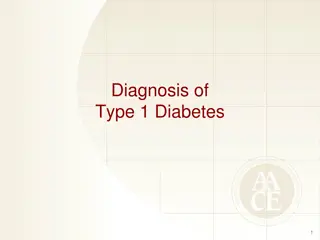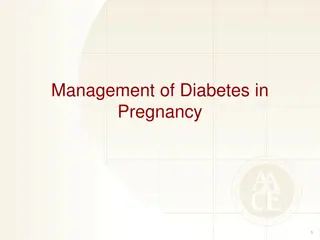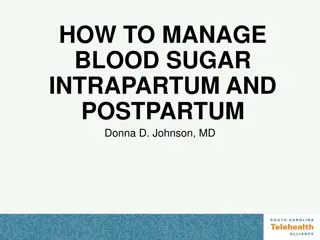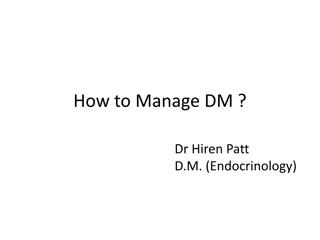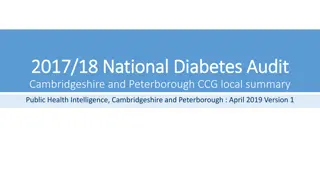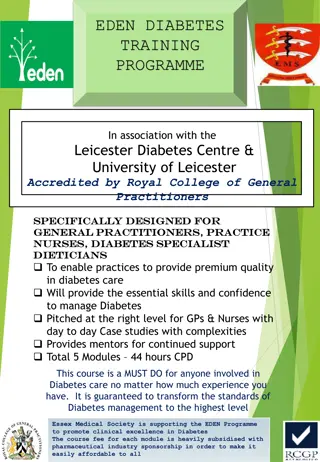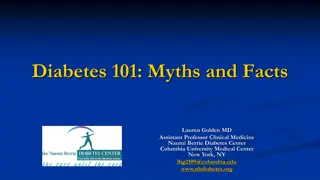Clinical Cases of Diabetes Management: Insights and Recommendations
Explore three detailed cases of patients with type 2 diabetes mellitus, their current treatment regimens, complications, and potential adjustments to improve glycemic control. Recommendations for treatment modifications, including insulin initiation, titration options, and lifestyle changes. Enhance your understanding of individualized diabetes management strategies.
Download Presentation

Please find below an Image/Link to download the presentation.
The content on the website is provided AS IS for your information and personal use only. It may not be sold, licensed, or shared on other websites without obtaining consent from the author. Download presentation by click this link. If you encounter any issues during the download, it is possible that the publisher has removed the file from their server.
E N D
Presentation Transcript
Insulin Workshop Amir Ahmad Nejat, MD Hengameh Abdi, MD Research Institute for Endocrine Sciences Shahid Beheshti University of Medical Sciences Tehran 1397.04.06 27 June 2018
Case 1 A 65-year-old driver man with 6-year history of type 2 DM is referred to you. He is taking metformin 2000 mg/day and gliclazide MR 60 mg/day. There is no history of cardiovascular disease. Ophthalmologic examination has revealed background retinopathy. 2
Case 1 In the past few months, his fasting glucose levels have ranged from 160-200 mg/dl. BMI: 25 kg/m HbA1c: 9.2% Cr: 0.8 mg/dl 3
Case 1 In addition to lifestyle modification, which treatment addition would you recommend to him? A. Long-acting insulin analogue with titration B. Insulin NPH with titration C. Sitagliptin 100 mg daily D. Premixed insulin analogue with titration Long-acting insulin analogue: Glargine (Lantus, Abasaglar); Detemir (Levemir) Premixed insulin analogue: Novomix 30/70 4
Case 2 A 53-year-old housewife with 12-year history of type 2 DM came to you. She is taking sitagliptin/metformin 50/1000 mg (after- breakfast and dinner) and glibenclamide 20 mg daily. There is no history of cardiovascular disease. Tells about history of non-proliferative retinopathy. Body weight: 82 kg; BMI: 30 kg/m HbA1c: 11.2% Cr: 1.1 mg/dl 5
Case 2 SMBG: Before breakfast: 180-260 mg/dl Before lunch: 170-200 mg/dl 5 pm: 160-220 mg/dl Before bed: 250-350 mg/dl She accepts initiation of insulin injection; however, she is not agreed with > 2 daily injections. She is extremely consistent from day-to-day in her activity level and in the timing and carbohydrate content of her meals. 6
Case 2 In addition to lifestyle modification and discontinuation of glibenclamide, which treatment would you recommend to her? A. Insulin glargine 14 U 10 pm and insulin aspart 6 U before dinner B. Insulin NPH 14 U 10 pm and insulin regular 6 U before dinner C. Insulin NPH 8 U before breakfast and before dinner D. Insulin novomix 30/70 8 U before breakfast and 8 U before dinner 7
Case 3 A 45-year-old active man with 8-year history of T2DM is treated with metformin 2000 mg daily and the following insulin regimen: Before breakfast: NPH 28 U Before dinner: NPH 12 U His SMBG documented overall desirable glucose levels; however, he tells about several episodes of symptomatic hypoglycemia, mostly in the early afternoon. Body weight: 62 kg 8
Case 3 After patient-physician discussion, insulin NPH was switched to insulin detemir 38 U at bedtime. Two weeks later, his glucose levels are: Before breakfast: 96-220 mg/dl Before lunch: 120-140 mg/dl Before evening meal: 180-220 mg/dl Before bed: 190-240 mg/dl He admits 2 times of nocturnal hypoglycemia during the last 10 days. 10
Case 3 His physician decided to change his insulin regimen to twice daily injection of detemir insulin, 20 U am and 18 U pm. Four weeks later, his glucose levels are: Before breakfast: 110-132 mg/dl Before lunch: 120-140 mg/dl Before evening meal: 92-136 mg/dl Before bed: 190-260 mg/dl He reported no episodes of hypoglycemia over the period. 12
Case 3 Insulin aspart 6 U before dinner, was added to his regimen. His blood glucose values were stable throughout the day up to 8 months later when his lifestyle change lead to excursions of his pre-lunch BS values. 14
Case 3 Insulin aspart 6 U before breakfast, was added to his regimen. His final insulin regimen is as follows: Insulin detemir: 20 U am, 18 U pm Insulin aspart: 6 U before breakfast and before dinner Four injections! Is there another choice? 16
Case 4 A 27-year-old woman presents for consultation regarding newly diagnosed gestational DM in her first pregnancy. She is at 30 weeks' gestation, and her pregnancy has otherwise been uncomplicated. She has no history of hyperglycemia or diabetes despite a diagnosis of polycystic ovary syndrome. Her father and sister have type 2 DM. She has gained 18.2 kg during the pregnancy. Her weight is 75 kg. 17
Case 4 Blood glucose value from a 50-g oral glucose tolerance test (GTT), performed at 28 weeks gestation was 165 mg/dl. 100-g GTT: FBS: 138 mg/dl BS after 1 h: 210 mg/dl BS after 2 h: 142 mg/dl BS after 3 h: 132 mg/dl Lifestyle modification is initiated in response to these abnormal test results. Fetal ultrasonography documents a large-for-gestational- age fetus. 18
Which additional data do you need for an appropriate therapeutic approach? 19
Case 4 SMBG results following lifestyle intervention: Before breakfast: 102-128 mg/dl Before lunch: 86-92 mg/dl 2h post lunch: 145-236 mg/dl Before dinner: 136-186 mg/dl 2h post dinner: 166 mg/dl Bedtime: 156-194 mg/dl 20
Case 4 In addition to nutritional counseling and lifestyle modification, the most appropriate treatment regimen for this patient would consist of which of the following? A) Metformin B) Glibenclamide C) Insulin D) Pioglitazone E) Sitagliptin 21
Case 4 Insulin regimen: Insulin detemir 8-10 U at 9-10 pm Insulin aspart 6 U before lunch and dinner 22
